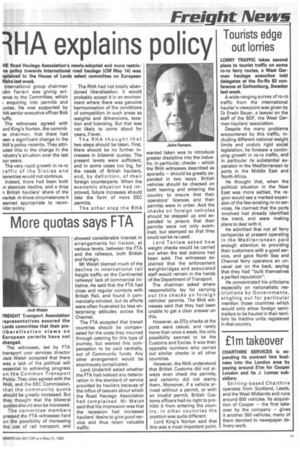11-1A explains policy
Page 13

If you've noticed an error in this article please click here to report it so we can fix it.
HE Road Haulage Association's newly-adopted and more restricye policy towards international road haulage (CM May 14) was xplained to the House of Lords select committee on European ffairs last week.
International group chairman ohn Farrant was giving evience to the Committee, which enquiring into permits and uotas. He was supported by HA senior executive officer Bob luffy.
The witnesses agreed with ord King's Norton, the commitchaifman, that there had ,een a significant change in the 1HA's policy recently. They attri
■ uted this to the change in the ldustry's situation over the last our years.
The very rapid growth in ro-ro raffic of the Sixties and ieventies would not continue. Indeed, there had been both in absolute decline, and a drop n British hauliers' share of the narket. In these circumstances it aemed appropriate to recon;icier policy.
The RHA had not totally abandoned liberalisation. It would probably accept it in an environment where there was genuine harmonisation of the conditions of competition in such areas as weights and dimensions, taxation and licensing. But that was not likely to come about for years, if ever.
The RHA thought that two steps should be taken. First, there should be no further increases in bilateral quotas. The present levels were sufficient, and in some cases too big, for the needs of British hauliers, and, by definition, of their foreign counterparts. When the economic situation had improved, future increases should take the form of more EEC permits.
The other step the RHA wanted taken was to introduce greater discipline into the industry. In particular, checks — which the RHA witnesses described as sporadic — should be greatly expanded in two ways. British vehicles should be checked on both leaving and entering the country to ensure that their operators' licences and their permits were in order. And the checks on foreign vehicles should be stepped up and expanded to _ensure that their permits were not only examined, but stamped so that they could not be re-used.
Lord Tanlaw asked how weight checks would be carried out when the test stations had been sold. The witnesses explained that the enforcement weighbridges and associated staff would remain in the hands of the Department of Transport.
The chairman asked where responsibility lay for carrying out the checks on foreign vehicles' permits. The RHA witnesses said that they had been unable to get a clear answer on this.
However, as DTp checks at the ports were casual, and rarely more than once a week, the only possibility seemed to be the Customs and Excise. It was their opposite numbers who carried out similar checks in all other countries.
However, the RHA understood that British Customs did not always even check the permits, and certainly did not stamp them. Moreover, if a vehicle arrived without a permit, or with an invalid permit, British Customs officers had no right to prohibit it from entering the country. In other countries the position was quite different.
Lord King's Norton said that this was a most important point.
























































































































